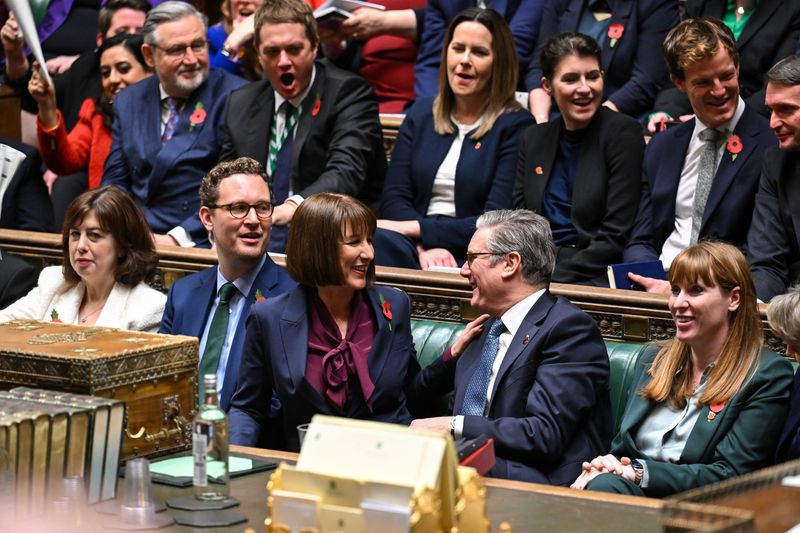By Naomi Rovnick and Yoruk Bahceli
LONDON (Reuters) -UK markets were spared painful blows from the new Labour government's first budget on Wednesday, which announced 40 billion pounds of tax hikes to plug shortfalls but soothed jitters about public spending blowouts and debt market disorder.
As finance minister Rachel Reeves balanced big debt and investment increases with pledges for tough control of day-to-day spending, investors' fears of a potential repeat of then-prime minister Liz Truss' chaotic September 2022 mini-Budget eased.
Government borrowing costs measured by 10-year gilt yields touched their highest since May at around 4.38%, but the move was modest in comparison to the surge two years ago. Sterling rose, meanwhile, and the domestically-focused FTSE mid-250 index briefly jumped more than 1.5%.
"Investors feared a new Liz Truss moment, but in the end the announcements do not suggest an uncontrolled surge in debt," Edmond de Rothschild Asset Management portfolio manager Nabil Milali said.
PRE-BUDGET NERVES
Investors pre-budget nerves had risen after data showed British public borrowing had reached nearly 100% of GDP and Reeves accused the former Conservative government, which Labour replaced in July's landslide election win, of creating a 22 billion pound fiscal "black hole".
In a sign of the unease, shares in UK retailers and pub operators had slumped for days and gilt yields had risen.
But after Reeves on Wednesday outlined about 100 billion pounds of capital spending over the next five years and directed tax grabs towards businesses instead of workers, the FTSE 250 index ended Wednesday higher while UK retail and banking stocks bounced.
"If this had been a more fiscally conservative budget you'd have expected gilts to rally further and equities to sell-off," Artemis fixed income manager Liam O'Donnell said.
The Institute for Fiscal Studies said Britain would borrow an average of 85 billion pounds a year over the next four years, up from 59 billion pounds under pre-election plans.
But whether the benefits from extra public investment would offset the costs was a "gamble", the economic research firm added.
Reeves confirmed that state indebtedness would now be measured against a broader definition of the public sector balance sheet, known as public sector net financial liabilities, which includes extra assets that can be offset against additional borrowing, to boost investment.
Borrowing plans released alongside the budget raised debt issuance this year to 296.9 billion pounds ($385.61 billion) from previous estimates of 277.7 billion pounds.
That was largely in line with Reuters' poll of primary dealers published this week, but gilt yields reversed their earlier fall and briefly shot up, with some investors citing the increase in longer-dated bond sales.
In addition to changing its debt definition, which markets had expected, the government said its rule on getting debt falling would eventually apply in the third year of its budget forecast. This contrasts to the previous government's rule, which was a rolling target for the fifth year, meaning plans to have debt falling were repeatedly pushed back.
"Reeves has done a reasonable job of buying credibility with the gilt market," said Marlborough fixed income manager James Athey, who added he was positive on British government debt and bond markets would appreciate the revenue boost from tax hikes.
Tom Williams, head of solutions trading and structuring at Schroders (LON:SDR), said he saw sufficient demand from pension schemes, banks and wealth managers for buying this year's debt sales "in an orderly way".
FTSE BOOST
Analysts also noted that the budget was unlikely to change the outlook for the Bank of England, which is expected to cut rates when it meets next week. Still, markets reduced odds for a November cut slightly and now see less than a 50% chance of a December cut.
Jason Da Silva, global investment strategy director at Arbuthnot Latham, said weak British consumer sentiment may also improve alongside Labour's pledges to raise health and capital spending.
"That should be good for UK-focused stocks, given they are already cheap," he said.
With British equities long depressed by public finance worries and political instability, the broad FTSE All-share index is trading at an almost 40% valuation discount to global peers.

"I have been overweight UK domestic stocks and smaller companies over the last year seeing them as beneficiaries of what was a healthy UK economic recovery," said Hugh Sergeant, head of value and recovery at investment firm River Global.
"These have been weak recently, due to nervousness in the lead-up to the budget. They have rallied today and I would expect them to continue to be strong."
